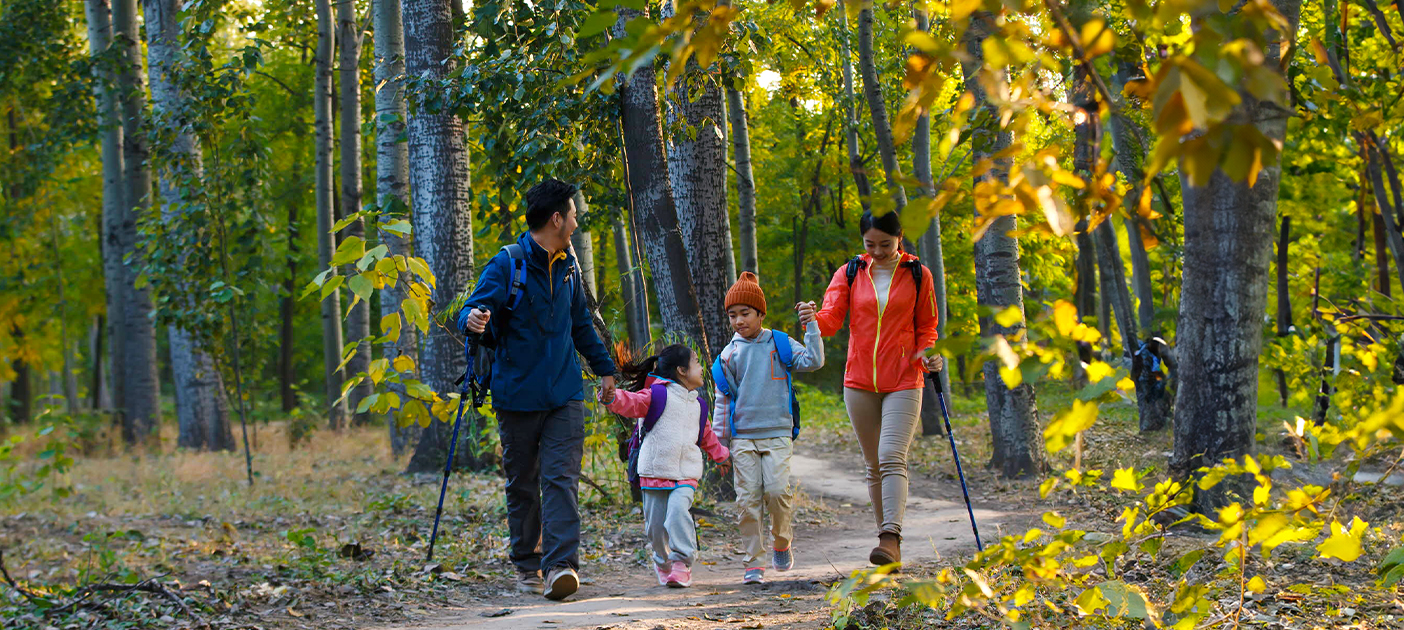How to travel smart with young kids
![]()
If you’ve only got a minute:
- Red-eye flights are great option for your outbound trip but for your return, aim to land by early evening.
- Booking accommodation early can save you money, especially during peak-travel periods like during the school holidays.
- When travelling with young children, find places that offer meals suited to their needs and an environment that accommodates families.
![]()
This article was produced in partnership with TripZilla.
While travelling with young children can be a thrilling adventure filled with laughter and unforgettable moments, it does come with its fair share of challenges.
After all, having to juggle between keeping the little ones entertained and handling parenting chores on holiday can be a daunting task. However, all it takes is a little bit of smart planning to turn your trip into an unforgettable experience filled with food, fun and stress-free family bonding.
Fun Fact: Did you know that the application fee for your little one's first passport is waived if you apply before their first birthday? Take this as your sign to start planning those family adventures early!

Pre-Trip Preparation
Being diligent in your pre-trip preparation can go a long way towards having an enjoyable time with the family.
Deciding the type of trip
Before you start planning, first determine what type of trip is suitable for your child’s age and personality.
If you have younger kids, consider taking shorter flights, boat rides, or even road trips, as these options can be more manageable and less overwhelming.
When it comes to deciding on a destination, resort or beach holidays can be ideal since they provide ample space and activities designed to keep children entertained, making them an excellent choice for family-friendly adventures.
By aligning your travel plans with your child's needs, you can set the stage for a more enjoyable and stress-free experience.
Timing your travel times
With young children, picking the right time to fly out of the country can make all the difference. Red-eye flights can be a great option for the outbound journey, as children tend to sleep longer through the night.
However, for your return trip, aim to land by early evening. This gives you time to settle in at home and get the kids ready for bed, keeping their routine intact and making the transition smoother for everyone.
You may also want to take some time to brief your child on what to expect throughout the trip. This includes walking them through airport security procedures, boarding the plane, and what happens during the flight. Simple explanations of traveller etiquette, like staying seated during take-off can help set expectations.
Choose family-friendly accommodation
When it comes to hotels, a comfortable and safe environment for your children is key. Consider booking a family room that provides extra space for kids to play and move around freely.
Avoid rooms with lofts, stairs, or bunk beds, as these can pose falling hazards for young kids who might try to climb. A bathroom with a bathtub will be a big plus as it makes bath time easier after a long day of activities.
Booking accommodation early can save you money, especially during peak-travel periods like during the school holidays. By securing your stay in advance, you can also benefit from early-bird discounts. Look for hotels with child-friendly amenities like baby cots, playrooms, and swimming pools. Since you will be travelling with young kids, it’s also important to check reviews for cleanliness, as young kids who may be crawling or playing on the floor.
Take advantage of platforms like DBS Travel Marketplace to compare flight and accommodation options across multiple airlines and hotels. This platform helps you find deals, earn miles, and allows you to explore flexible payment options.
Find out more about: DBS Travel Marketplace
Survive the long waits
Long journeys can be tough on young kids, but a little preparation can go a long way in making the trip enjoyable. For flights, pack a small "fun bag" filled with activities like sticker books, colouring supplies or puzzles.
For road trips, create a playlist of their favourite songs or audiobooks and schedule scenic stops where they can stretch their legs.

Food for the soul
As many parents will attest, when travelling with young children, ensuring that they are well fed and keeping mealtimes regular, is key.
Choose kid-friendly dining options
Find places that offer meals suited to your children’s preferences and an environment that accommodates families. Look for child-friendly restaurants that provide amenities such as baby chairs.
Safety is another key consideration — hotpot restaurants and Korean BBQs, which involve open flames or hot surfaces can pose burn hazards for curious little ones so it would be best to stay clear of those.
If you’re travelling to a country with unfamiliar cuisine, make sure your little ones have "safe" food to fall back on during the trip. You can’t go wrong with ordering a basket of bread at restaurants — it typically comes quickly and can keep your child entertained and fed.
Do keep an eye out for discounts for your children. Some places have “kids eat free” promotions or set menus at reduced prices, which can be a fantastic way to save money while dining out!
To further manage expenses, consider using the DBS Travel Wallet, which offers up to 5% cashback and zero overseas transaction fees. This convenient multi-currency wallet allows you to exchange and spend in 11 currencies seamlessly through the DBS digibank app.
On top of this, take advantage of travel promotions for flights and hotel bookings with the DBS Altitude Card. By registering on DBS PayLah!, you can earn up to 5 miles per S$1 on your online travel bookings or foreign spending when you reach a minimum spend of S$1,000 per month. Plus, your accumulated DBS points from card spending can be redeemed for flights, making your travel experience even more rewarding!
Find out more about: DBS PayLah!
Be armed with snacks
Don’t underestimate the importance of snacks! Long travel days can make young children cranky, and having a supply of their favourite snacks on hand can be a lifesaver. Pack a variety of easy-to-carry snacks like crackers, nuts or dried fruit for the flight, car rides, or sightseeing adventures.
Snacks at tourist attractions can be pricey, so pack snacks from home or buy them at local grocery stores to save money while keeping your kids happy!
Cater to special dietary needs
If your child has special dietary needs, staying at a serviced apartment with a kitchen can be a game-changer. It allows you to prepare familiar meals for your kids, ensuring they eat safely and comfortably.
Cooking your meals also helps save money compared to dining out, giving you the chance to incorporate local ingredients and add a cultural twist to your dining experience. Another major advantage of staying in serviced apartments is their laundry facilities, which allow you to pack lighter and avoid a pile-up of dirty clothes during your trip.

Keeping the young ones engaged
Holidays are an excellent opportunity to engage in fun-filled activities that foster interaction both within the family and with others.
Prep yourself for fun
Make sure you're well-prepared for any situation. Pack essential items like medicine, supplements like vitamins and probiotics to maintain gut health, sunscreen, insect repellent, and appropriate clothing for the climate — whether it's warm layers for chilly destinations or light, breathable fabrics for hot climates. Having these on hand ensures that your kids are comfortable and ready to enjoy the activities you have planned.
For parents of younger children, don’t forget to bring along diapers, milk, and brushes to clean milk bottles. A baby carrier or pram can also be a lifesaver for navigating through your travel adventures.
Safeguard your trip with travel insurance like TravellerShield Plus which offers comprehensive coverage, protecting you from risks like trip cancellations, medical evacuation/repatriation in the event of emergencies, lost luggage, and more!
With this peace of mind, you can focus on creating fun, worry-free memories with your family. This simple step ensures that you’re ready for any unexpected bumps along the way, making your trip smoother and stress-free.
Read more: Choosing the right travel insurance
Find out more about: TravellerShield Plus
Pick fun-filled destinations for families
When choosing your travel itinerary, focus on places that will captivate your children’s attention and energy.
Opt for interactive museums, beaches, or nature walks where they can explore freely. Destinations like zoos, aquariums and animal farms with wide-open spaces are always a hit as well!
These places are typically more affordable than the overcrowded theme parks and often offer educational experiences that allow kids to learn about animals, nature, or history in a hands-on way.
Financial skills for the family
Consider introducing your children to basic money management skills by giving them a small budget for souvenirs or gifts. Whether it’s a snack from a local supermarket or a fun toy from a nearby shop, this little financial freedom empowers them to make choices and enhances their excitement as they explore new places.
Watching them weigh options and make decisions can turn budgeting into a fun and educational experience!
Using a credit or debit card for these small purchases adds an extra layer of convenience. With options that offer cashback, rewards, and global acceptance, DBS/POSB cards simplify your family’s spending, giving you peace of mind as you make memories together.
Find out more about: DBS Cards
Making memorable moments
Given that it takes much time and effort to plan a family holiday, always make the best of your time together create wonderful memories with these tips.
Unplug and reconnect
These days, it's easy to get lost in screens, even on vacation. However, travelling offers the perfect opportunity for families to unplug and truly reconnect. Encourage your family to take a break from devices and enjoy activities like playing board games instead.
While vacations are packed with activities, it’s essential to include some downtime into your schedule, especially when travelling with young children.
A flexible itinerary is key — while it’s important to include at least 1 activity each day that kids can look forward to, being adaptable can make all the difference. For instance, if rain disrupts your plans for outdoor fun, a trip to a local supermarket can be an easy and equally exciting adventure for little ones!
Handle tense situations
Let’s be real: Spending every waking moment together with someone, even your family, can be overwhelming. Arguments or frustrations can arise, and that’s perfectly normal.
It's important to carve out small pockets of time for parents to enjoy personal activities like shopping or trying out local food.
Taking turns to care for the kids while the other parent enjoys 15 to 30 minutes of solo time can work wonders in keeping everyone’s morale high.
After all, family travel isn’t just about keeping the kids entertained — it’s also about ensuring that everyone, including the parents, gets a chance to unwind and enjoy the trip.
Ready to start your vacation?
Travelling with your child is less about the things you can buy or the expensive attractions you visit, and more about the invaluable memories you create together.
So, take a moment to slow down and truly embrace your holiday, allowing time for genuine connection rather than rushing to check off every item on your itinerary.
By immersing yourselves in diverse cultures and experiences, you not only enrich your own life but also cultivate a lifelong love for exploration in your child!
Ready to start?
Check out digibank to analyse your real-time financial health. The best part is, it’s fuss-free – we automatically work out your money flows and provide money tips.
Speak to the Wealth Planning Manager today for a financial health check and how you can better plan your finances.
Disclaimers and Important Notice
This article is meant for information only and should not be relied upon as financial advice. Before making any decision to buy, sell or hold any investment or insurance product, you should seek advice from a financial adviser regarding its suitability.








That's great to hear. Anything you'd like to add? (Optional)
We’re sorry to hear that. How can we do better? (Optional)